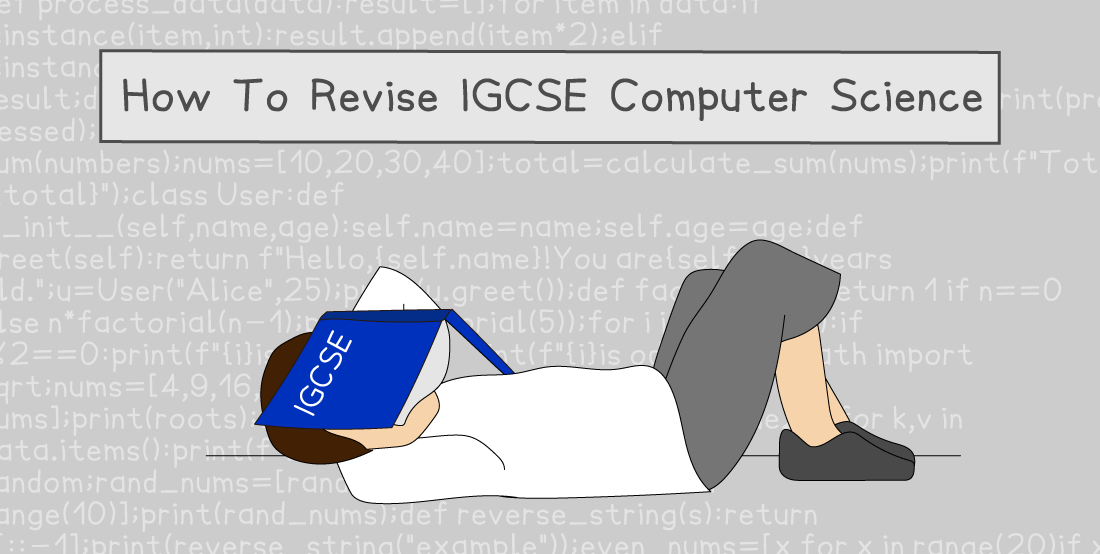How to Revise for IGCSE Computer Science
Written by: Robert Hampton
Reviewed by: James Woodhouse
Last updated

Contents
- 1. Using past papers effectively
- 2. Active recall with flashcards
- 3. Creating mind maps for complex topics
- 4. Practising pseudocode and flowcharts
- 5. Teaching someone else
- 6. Time management strategies for the exam
- 7. Understanding command words in exam questions
- 8. Breaking down mark schemes
- 9. Improve Your Grades with Save My Exams
Are your exams approaching quickly? Feeling overwhelmed by the sheer volume of material or unsure where to even begin your revision? Many students find themselves in this position, but effective revision is key to achieving the best grade possible. IGCSE Computer Science isn't just about memorising facts, it requires a strong understanding of computer systems, programming, problem-solving, and logical thinking. The best revision strategies combine theory, practical application, and exam techniques.
In this article, I’ll share the strategies I used with my students to help them achieve success in their exams, whether for mocks or the real thing. Not every strategy works for everyone, so try them all and find what suits you best.
By the end of this article, you’ll have a clear plan to improve your understanding, tackle past paper questions with confidence, and feel prepared for exam day.
Revision tactics covered:
Using past papers effectively
Active recall with flashcards
Creating mind maps for complex topics
Practising pseudocode and flowcharts
Breaking down mark schemes
Teaching someone else
Time management strategies for the exam
Understanding command words in exam questions
Using past papers effectively
Past papers are one of the most valuable resources for IGCSE Computer Science revision. They help familiarise you with question styles, command words, and how to apply your knowledge under exam conditions.
Start by answering questions with your notes as a reference.
Move to timed conditions to simulate the real exam.
Mark your work using the mark scheme to identify gaps in understanding.
Track common mistakes and revise weaker topics.
When using past papers, it’s easy to focus on what you know well, but the biggest improvements come from practising the areas you find difficult. I always encouraged my students to pick the hardest questions first, rather than avoid them. This method ensures real progress and better results. For example, focusing on past paper questions related to file handling or data representation can be particularly helpful.
From my experience, the best place to start is with the most recent papers. Older papers can sometimes contain question styles that are no longer relevant, which may lead to unnecessary panic if the format changes.
Active recall with flashcards
Active recall is a scientifically proven technique that strengthens memory by forcing your brain to retrieve information rather than passively reviewing notes.
Create flashcards with a question on one side and the answer on the other.
Focus on key definitions, binary conversions, and logic gates. For example, create flashcards for terms like "encryption," "decryption," "hashing," or specific logic gate functions.
Use digital tools, including the flashcards available on Save My Exams, for spaced repetition.
Regularly shuffle and test yourself to challenge recall.
In IGCSE Computer Science, understanding technical terms is crucial. For example, answering a question on encryption requires that you fully grasp what encryption means in the first place. Flashcards are a great way to ensure you don’t get caught out.
Creating mind maps for complex topics
Mind maps help break down difficult topics and show connections between ideas. They are particularly useful for structuring knowledge in areas like computer architecture, networking, and algorithms.
Start with a central topic (e.g. ‘Data Transmission’).
Branch out to subtopics like packet switching, protocols, and encryption.
Use different colours and diagrams to group related concepts.
Add example explanations to reinforce understanding.
Students who effectively used mind maps in the classroom, for example, a topic such as Network Hardware. It allowed them to see the relationships between Network Interface Cards (NIC), MAC & IP addresses, and routers, which makes recall much easier in an exam. Many of my students also found that adding colours, drawings, and effects helped with memory retention.
If you prefer a digital approach, MindMeister is a great online tool that my students have used to create and collaborate on mind maps.
Practising pseudocode and flowcharts
Programming is a practical skill, and the best way to improve is through consistent practice.
Write pseudocode for common problems like searching and sorting algorithms.
Convert pseudocode into flowcharts to visualise logic.
Compare your answers with mark schemes to improve accuracy.
When I was preparing students for the exam, I always emphasised that writing pseudocode often makes algorithms much neater and easier to read. Some students struggled with drawing flowcharts neatly, which made their answers harder to follow. However, don’t forget that some questions require flowcharts, so you need to practise both!
A great place to start is our past paper exam questions, which include student-friendly mark schemes and sample answers to help guide your revision.
Teaching someone else
One of the most effective ways to test your understanding is by explaining a topic to someone else.
Pair up with a classmate and take turns explaining topics.
Record a short video or write a simple guide for a tricky concept.
Use the Feynman Technique: Explain it simply, identify gaps, and then refine your explanation.
I often asked my students to teach a concept to the class - it was a great way to see where they had gaps in their knowledge. Von Neumann Architecture is a great topic to try this with. If you can explain it clearly, then you know you’ve mastered it.
Time management strategies for the exam
Managing your time effectively is key to maximising marks and avoiding stress.
Use the ‘One Mark = One Minute’ Rule: In a 75-mark, 1-hour 45-minute exam, aim for one mark per minute giving you plenty of time at the end to check your answers thoroughly.
Use the ‘Two-Pass Rule’: Answer easy questions first, then return to harder ones.
Practise under timed conditions to build confidence.
I always told my students to allocate their time based on the number of marks available. This ensures they don’t spend too long on one question and run out of time for others.
This strategy was particularly useful for students who tended to finish exams too quickly, helping them pace themselves more effectively.
Understanding command words in exam questions
IGCSE Computer Science exams use specific command words that indicate the required level of detail.
‘Explain’ – Give reasons why something happens.
‘Evaluate’ – Consider strengths and weaknesses before forming a conclusion.
‘Describe’ – Provide details about a topic or process.
Knowing these before the exam will help structure your answers and prevent vague responses that lose marks.
Consider the command word "evaluate." If a question asks you to "evaluate the advantages and disadvantages of using a solid-state drive (SSD) versus a hard disk drive (HDD)," it's a clear indication that more than just listing pros and cons is required. You need to weigh the different factors, considering things like speed, cost, capacity, durability, and power consumption. A good evaluation would then draw a reasoned conclusion, perhaps suggesting which type of drive is more suitable for particular applications (e.g., SSDs for fast boot times, HDDs for mass storage).
Recognising the "evaluate" command word before the exam prepares you to structure your answer as a balanced argument leading to a justified judgment.
Breaking down mark schemes
Mark schemes show exactly what examiners look for, making them an essential revision tool.
Study past mark schemes to spot patterns in expected answers.
Highlight key terms and required points for full marks.
Practise writing answers that match mark scheme expectations.
From my experience, students who regularly marked their own answers and reviewed examiner reports performed better. This process helps you understand exactly what is needed for full marks. For example, if a question asks for the advantages and disadvantages of a particular network topology, the mark scheme will specify the exact points needed for each advantage and disadvantage.
Improve Your Grades with Save My Exams
At Save My Exams, we’re here to help you get the best possible grade in IGCSE Computer Science. Our expert resources are designed to make revision straightforward and effective, so you can feel confident going into your exams. Created by experienced teachers and examiners, our materials are tailored to your exam board and packed with everything you need to succeed:
Clear and concise revision notes that break down tricky topics into easy-to-understand explanations
Exam-style questions with detailed mark schemes, so you know exactly what examiners are looking for
Past papers with mark schemes to help you practise and perfect your technique
Flashcards for quick-fire revision and easy recall of key facts and definitions
Whether you're brushing up on the basics, testing your knowledge, or fine-tuning your exam strategy, Save My Exams has everything you need to stay on track. Start revising smarter today and take the stress out of exam prep!
Explore Our IGCSE Computer Science Revision Resources
References
Sign up for articles sent directly to your inbox
Receive news, articles and guides directly from our team of experts.

Share this article


 written revision resources that improve your
written revision resources that improve your